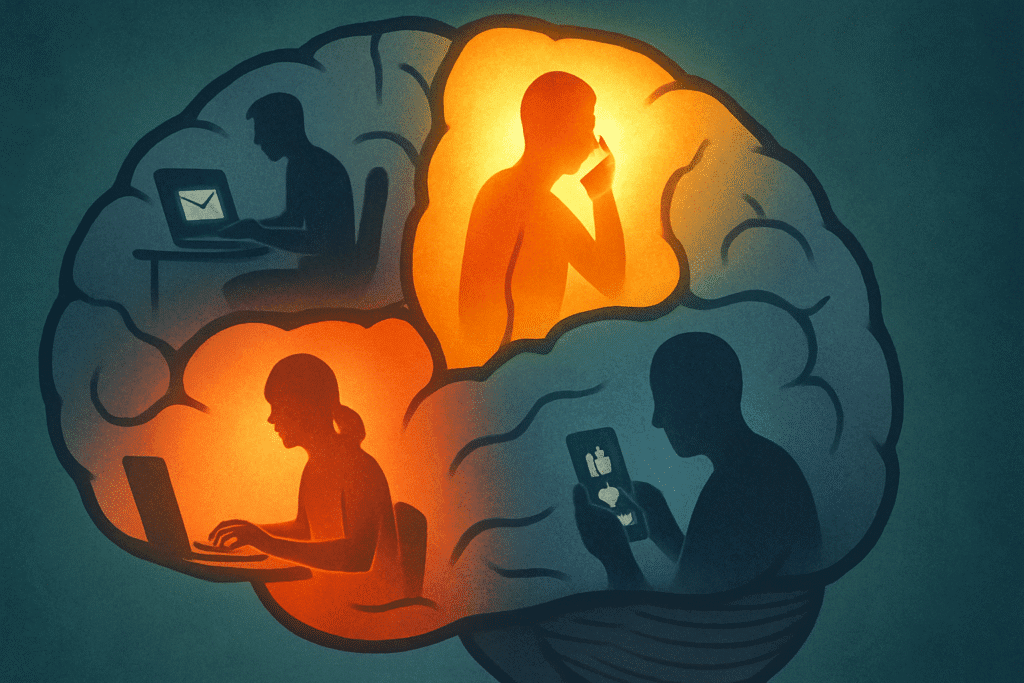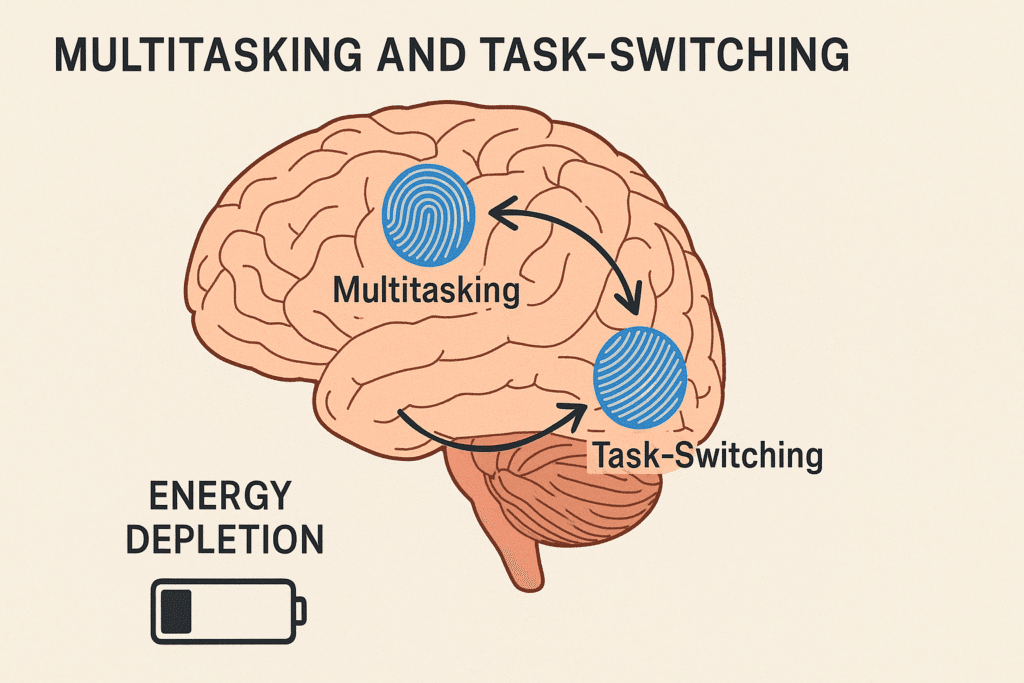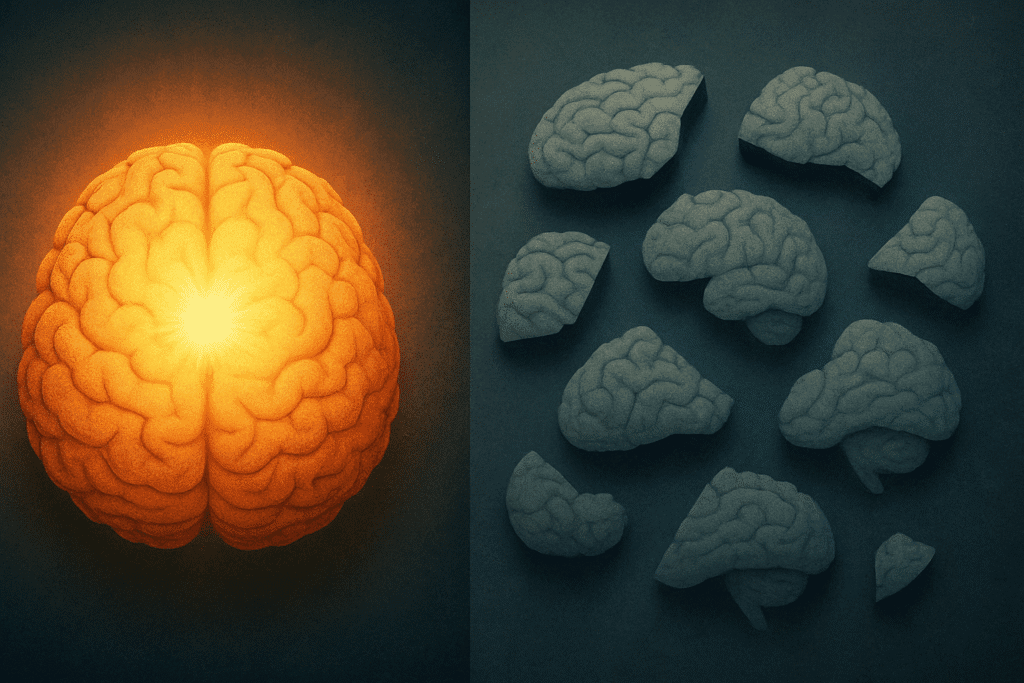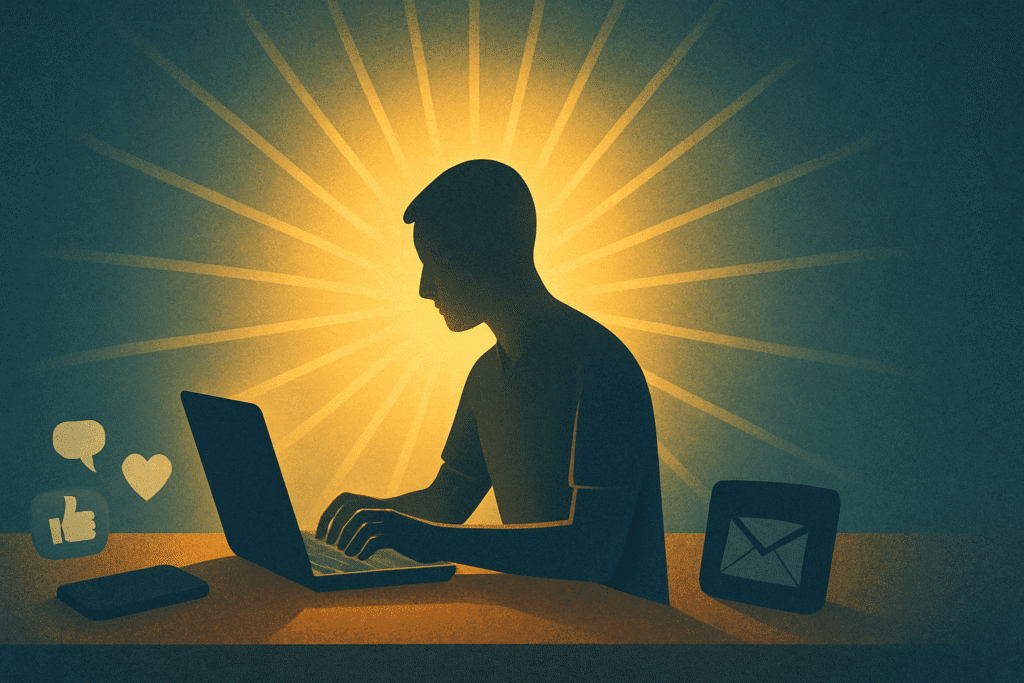Introduction:

You think juggling five things at once makes you productive?
It doesn’t. It makes you stupid — literally.
Modern life praises multitasking like it’s a superpower.
Answer emails while in meetings. Watch videos while working.
Scroll your phone while “relaxing.”
But here’s what neuroscience says:
Multitasking isn’t multitasking. It’s just rapid task-switching — and your brain sucks at it.
Each switch burns energy, kills focus, and floods your mind with noise.
You feel busy, but you’re getting nothing done. Worse — you’re training your brain to be distracted.
In this blog, you’ll learn:
- Why multitasking decreases your IQ (temporarily as much as being sleep-deprived)
- How it rewires your brain to lose deep focus
- What to do instead to boost clarity, creativity, and actual productivity
This isn’t just about working smarter — it’s about reclaiming your brain.
Ready for the hard truth? Let’s dive in.
Multitasking Isn’t Real — It’s Task-Switching, and It’s Killing Your Focus

Your brain can’t focus on two complex tasks at the same time.
Typing an email and listening to a meeting? One of them suffers. Always.
What you’re actually doing is switching — flipping from task to task, over and over.
And every switch comes with a cost.
Neuroscientists call this the “switch cost.”
You lose milliseconds — even full seconds — as your brain resets.
Add that up across the day? You’re losing 40% of your productive time.
It’s like trying to run while changing shoes every 10 steps.
And here’s the kicker:
You feel productive, because you’re busy. But busyness isn’t effectiveness.
Multitasking is a dopamine trap. It feeds your brain hits of “new” — but leaves nothing meaningful behind.
Your brain craves focus. And multitasking starves it.
Multitasking Shrinks Your Brain (Literally)
Think this is just about lost time? Think again.
Studies from the University of Sussex found that people who heavily multitask have less gray matter in the brain region responsible for empathy, cognition, and emotional control — the anterior cingulate cortex.
Translation?
The more you juggle, the more your brain’s control center weakens.
This isn’t just bad for work — it’s bad for your self-awareness, relationships, and decision-making.
Constant multitasking rewires your brain for surface-level thinking.
You become great at reacting… and terrible at thinking deeply.
You’re Not Being Productive — You’re Just Switching Tasks Fast
Multitasking feels efficient.
You answer emails while in a Zoom call. Scroll Twitter while “reading” an article. Bounce between tabs like a pro.
But here’s the truth:
You’re not doing multiple things at once.
You’re just switching between tasks really fast — and every switch comes with a cost.
It’s called task-switching penalty. Each time you shift attention, your brain needs time to recalibrate. That lag adds up.
Research shows multitasking can reduce productivity by up to 40%.
So while you feel busy, you’re actually slower, sloppier, and more likely to make mistakes.
Multitasking Lowers IQ — Literally
A study from the University of London found that people who multitasked during cognitive tasks experienced IQ drops similar to those who stayed up all night.
In some cases?
Up to 15 points lost. That’s the mental equivalent of being an 8-year-old trying to make business decisions.
Even worse? These effects can be long-term.
Chronic multitasking rewires your brain.
MRI scans show that habitual multitaskers have less brain density in the anterior cingulate cortex — the part responsible for empathy, decision-making, and emotional control.
So you’re not just getting dumber short-term.
You’re training your brain to stay distracted.
Multitasking Creates the Illusion of Productivity (But You’re Just Busy, Not Effective)
Multitasking is the modern badge of honor.
Replying to emails while on a Zoom call. Scrolling Instagram while “working.” Juggling five tasks with three open tabs and half your attention.
It feels productive. You’re doing a lot.
But neuroscience says otherwise.
Each time you switch between tasks, your brain pays a switching cost — a moment of mental lag, confusion, and reorientation. According to studies by the American Psychological Association, this can reduce your output by up to 40%. You think you’re saving time, but in reality, you’re bleeding it.
Instead of deep, meaningful work, you’re spreading your focus so thin that nothing gets done properly.
You’re not being efficient — you’re being distracted.
This constant task-jumping also ramps up cognitive fatigue, which leads to more mistakes, slower thinking, and lower creativity.
The worst part?
You feel exhausted, but with nothing real to show for it.
Multitasking doesn’t make you productive.
It just makes you look busy while staying stuck.
The Neuroscience of Multitasking: Why Your Brain Can’t Handle It

Your brain isn’t built to juggle multiple complex tasks at once. It thrives on focused attention.
Studies in neuroscience show that the human brain can only truly focus on one task at a time. While it may seem like you’re handling two or three things simultaneously, your brain is actually switching back and forth between tasks rapidly. This is called task-switching, and it’s far less efficient than single-tasking.
Every time you switch tasks, your brain has to re-engage. It has to refocus, process new information, and adjust to the demands of the next task. This creates a significant delay and consumes energy. The more you multitask, the more you exhaust your brain’s cognitive resources. Over time, this leads to a drop in performance, creativity, and problem-solving ability.
In simple terms: multitasking wears down your brain’s ability to function at its best.
Multitasking Reduces Your Cognitive Efficiency
Every time you attempt to multitask, you are demanding your brain to switch between tasks, which creates a “lag” in processing. Here’s why:
- Mental Load: When your brain constantly shifts focus, it can’t give its full attention to any one task. This mental fragmentation leads to a drop in efficiency and performance.
- Cognitive Overload: With too many tasks on your mind, you overload your cognitive system. The more things you try to handle at once, the less likely you are to complete any of them effectively.
- Increased Errors: The more frequently you multitask, the more likely you are to make mistakes. Studies show that multitaskers are more prone to errors because their attention is spread too thin.
Rather than speeding things up, multitasking slows down your brain, leading to lower productivity, and leaving you feeling mentally drained at the end of the day.
The Neuroscience Behind Multitasking: Why Your Brain Can’t Handle It
The truth is that your brain isn’t designed to handle multiple tasks at once. When you attempt to multitask, what’s actually happening is that you’re rapidly switching between tasks — not doing them simultaneously. This constant switching has several negative effects on your brain’s efficiency and performance. Here’s why:
- Cognitive Switching Costs Every time you switch from one task to another, your brain incurs a “cognitive cost.” It needs to adjust, refocus, and reorient itself to the new task. Research shows that it can take up to 23 minutes for your brain to refocus after switching tasks. Imagine the time wasted in just a few hours of multitasking. These constant shifts make you feel like you’re being productive when, in reality, you’re only scattering your focus, making progress on none of the tasks you’re attempting to juggle.
- Increased Mental Fatigue Multitasking is mentally taxing. The more you bounce between different tasks, the more you’re taxing your brain’s working memory and cognitive resources. Your brain has a limited amount of processing power and energy to spend on each task. When you spread it across too many things, it leads to faster burnout and cognitive exhaustion.
- Impact on Deep Work The term “deep work,” coined by Cal Newport, refers to long periods of undistracted work that lead to high productivity and quality. When you multitask, you prevent your brain from entering this deep, focused state. Instead, you only ever operate in shallow work mode, moving from one task to the next without ever diving deeply into one thing. This shallow approach hampers your ability to achieve mastery or produce high-quality work, which is what most successful people strive for.
- Memory and Learning Problems Studies have shown that multitasking has a direct impact on memory. The reason is that when you divide your attention between tasks, your brain struggles to commit information to long-term memory. This is because you’re not allowing your brain to focus long enough on the task at hand to create solid memory traces. This can result in more forgetfulness and slower learning, especially when trying to absorb complex material or information.
- Impact on Creativity Creativity thrives on focus and depth. Multitasking prevents you from spending quality time on brainstorming, problem-solving, or ideating. Research in neuroscience suggests that creative thinking requires a quiet, focused mind that can immerse itself in a topic without interruption. When multitasking, you’re only giving surface-level attention to multiple things, leaving little room for innovative thinking or deep creative processes.
The Cognitive Costs: How Multitasking Impairs Your Brain’s Performance

When we talk about multitasking, we often think it’s a skill — something we can master to handle multiple tasks with ease. But research paints a very different picture: multitasking is a myth, and its effects on our cognitive performance are far more damaging than we realize.
Here’s why your brain can’t juggle multiple tasks:
- Decreased Cognitive Efficiency Your brain isn’t built to handle several things at once. When you switch between tasks, your brain needs to stop processing one task to start another. This constant reorientation decreases your cognitive efficiency, leading to more mistakes and slower task completion. You may feel productive because you’re working on multiple things, but in reality, you’re accomplishing less overall. This inefficiency increases your cognitive load, making you feel mentally drained even though you haven’t done as much work as you think.
- Impaired Focus and Attention The human brain has a limited capacity for focused attention. Every time you shift your focus, you lose a fraction of your ability to concentrate. This “attentional blink” means that when you jump from one task to another, you lose track of critical details. The more you multitask, the harder it becomes to stay fully engaged with any one task, which directly impacts your ability to produce high-quality work. Research also shows that multitasking can reduce attention span over time, contributing to increased difficulty concentrating on long tasks.
- Neural Overload and Decreased Processing Speed Studies show that multitasking doesn’t just make you less productive, it also overloads your brain. The brain has a finite amount of neural processing resources. When you multitask, it spreads these resources thin, which lowers the efficiency of the brain’s processing speed. Essentially, the more you divide your attention, the slower your brain works — this translates into more time spent completing tasks, lower-quality output, and a greater sense of mental fatigue.
- Strained Working Memory Working memory is the part of your brain responsible for holding and manipulating information in the short term. Multitasking places a massive strain on this system. When you try to manage multiple tasks, you reduce your ability to store and recall information. As a result, you’re more likely to forget important details, make errors, or miss steps in your process. This can significantly impact everything from simple tasks like remembering where you left your keys, to more complex work tasks like managing deadlines and project details.
- Emotional and Mental Stress Beyond cognitive effects, multitasking also increases stress levels. When you constantly jump between tasks, your brain experiences a surge of cortisol, the stress hormone. This can make you feel overwhelmed and anxious, especially when you’re juggling numerous responsibilities. Over time, chronic stress from multitasking can lead to burnout, exhaustion, and a decreased ability to function well under pressure.
Conclusion: Embrace Single-Tasking for True Productivity and Mental Clarity

The science is clear: multitasking isn’t the miracle productivity solution it’s often made out to be. Instead, it’s a cognitive trap that leads to inefficiency, mental overload, and diminished performance across the board. While it might feel like you’re getting more done by juggling multiple tasks at once, in reality, you’re slowing yourself down, making more mistakes, and draining your mental energy.
The key to true productivity and brain health lies in embracing single-tasking — focusing on one task at a time. By training your brain to concentrate fully on the task at hand, you not only improve your cognitive efficiency but also reduce stress, enhance memory, and increase the quality of your work.
Next time you feel the urge to juggle tasks, remind yourself that focusing on one thing at a time will yield far better results, both in the short and long term. When you eliminate distractions and stop switching between tasks, your brain can perform at its peak, allowing you to accomplish more, with less effort.
In a world full of distractions, single-tasking might be the true productivity hack you’ve been searching for.
Recommended Books:
- The One Thing by Gary Keller – A deep dive into the power of focusing on the one thing that makes all other tasks easier or unnecessary.
- Deep Work by Cal Newport – Learn how to focus without distractions and produce high-quality work in less time.
- Atomic Habits by James Clear – Discover how small, consistent changes can lead to big results, including how to break the multitasking habit.
FAQ’s
Is multitasking really harmful to the brain?
Yes, studies have shown that multitasking can reduce cognitive performance, leading to slower processing and poorer memory retention. When we multitask, our brain switches rapidly between tasks, which results in decreased efficiency and mental fatigue. This constant switching can even impair our long-term memory.
Can I improve my brain function by avoiding multitasking?
Absolutely! By focusing on one task at a time, you allow your brain to work more efficiently. This leads to better concentration, improved memory, and enhanced overall cognitive function. It also helps reduce stress, as you’re not constantly switching gears between different tasks.
How does multitasking affect my productivity in the long run?
While multitasking might feel like you’re getting more done, it actually reduces productivity. Constant task switching takes up more time and energy than focusing on a single task, leading to inefficiency and burnout. Over time, this can negatively impact your ability to perform well in both professional and personal tasks.
Is there ever a time when multitasking is beneficial?
Multitasking can be effective for simple, low-concentration tasks that don’t require much cognitive effort. For example, folding laundry while listening to a podcast or checking emails during a meeting. However, for tasks that require critical thinking, creativity, or problem-solving, focusing on one task at a time is more effective.
How can I stop multitasking and focus better?
To improve focus, try strategies like time-blocking, where you set aside specific times for each task, and the Pomodoro technique, which involves working in short bursts with regular breaks. Minimizing distractions, such as turning off notifications or working in a quiet environment, can also help you stay on track.
